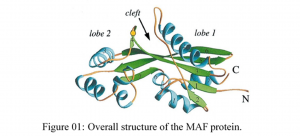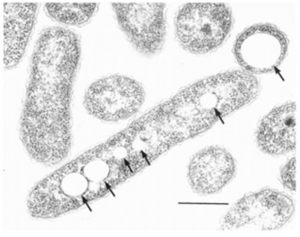Bacterial MAF Proteins as an Anti-Cancer Therapy

Chamindri Witharana
(BSc(Hons) (Col), Mphil (Wales), PhD(Giessen)
Senior Lecturer, Department of Biochemistry and Molecular Biology, Faculty of Medicine, Colombo
Cancer is one of the leading causes of mortality and morbidity among the worldwide human population. Even though there are various treatment options available for cancer, almost all of them are associated with different adverse health effects. Since almost all the anti-cancer therapies have side effects, more research is needed to find more effective drugs to combat the cancer with minimal undesirable effects.
The role of bacterial proteins and peptides as effective chemotherapeutic and chemopreventive agents with minimal undesirable effects has been an area of research interest. Researchers have identified Multicopy Associated Filamentation (MAF) protein of Bacillus subtilis as a negative regulator of cells, with an inhibitory effect on septum formation during cell division. The biochemical activity and functional mechanism of MAF protein remain unknown, however, it is believed that MAF protein is associated with cell division arrest. It has been discovered that MAF protein is a putative inhibitor of septum formation in bacteria, archaea and eukaryotes.

Our research team including Raushan Siraj, Lihini Ranesha Weerakkody, Bhagya Dharmawickreme hypothesized that maf gene product as a potential anti-cancer substance to inhibit the cell division process by forming filaments in cancer cells.
The objective of this research was to clone, express and determine the biological effect on cancer cell viability of MAF protein of Caldimonas manganoxidans MS1, a native thermophilic organism previously isolated from Maha Oya hot water springs of Sri Lanka.
 Figure 02: Maha Oya hot water springs of Sri Lanka
Figure 02: Maha Oya hot water springs of Sri Lanka
 Figure 03: Electron micrographs of Caldimonas manganoxidans
Figure 03: Electron micrographs of Caldimonas manganoxidans
In our laboratory, we have isolated the genomic DNA from Caldimonas manganoxidans MS1 by a newly developed method. SDS PAGE analysis indicated a molecular weight of around 22 kDa for the recombinant, purified MAF protein.
Firstly we characterized Caldimonas manganoxidans MS 1. Further then we focused on the over-expression of maf gene of Caldimonas manganoxidans MS1 in order to determine the negative effect of MAF protein on cell viability of human cancer cells. We further discovered that the over-expressed, purified, recombinant MAF protein of Caldimonas manganoxidans MS1 strain decreases the viability of prokaryotic cells. If MAF protein shows a negative effect on cell viability as expected, MAF proteins could be used as an effective therapeutic agent to treat cancer patients in the future.
Presently we are investigating over-expressed, purified MAF protein on human cancer cell lines such as human hepatocellular carcinoma (HepG2) and human rhabdomyosarcoma (RD) cell lines to determine its inhibitory effect on cellular viability and we have promising results!
In the future, this findings can lead to practical implementation, especially in the pharmaceutical industry due to its potency to decrease the number of viable cells in a given cell population, rendering it as a potential therapeutic agent.
Principal Investigator:
Dr. Chamindri Witharana
![]()
